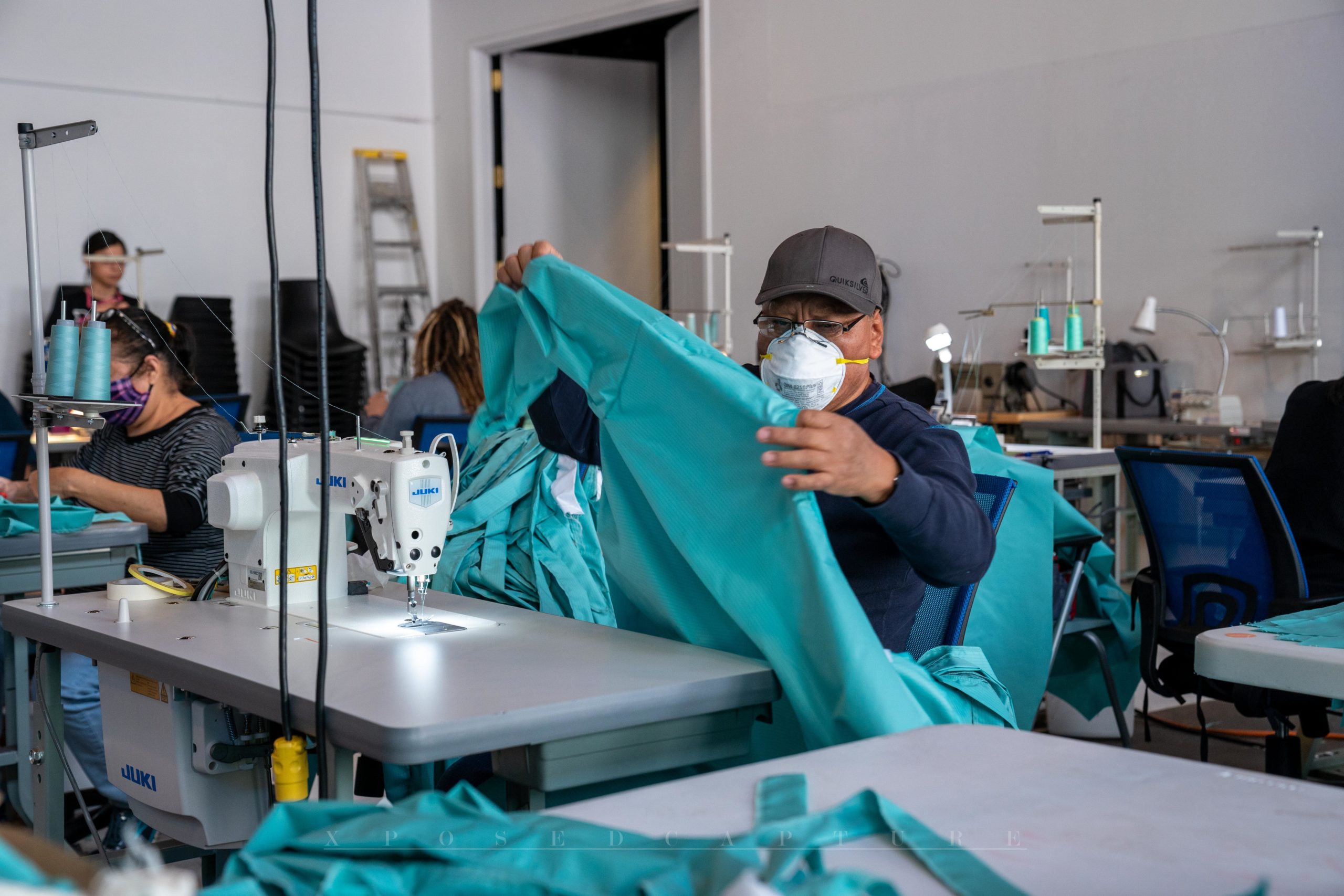In mid-March of 2020, as businesses began to shut down and the PPE shortage became the nation’s biggest concern, FABRIC began its transformation from fashion incubator to PPE manufacturer. Two months in, and FABRIC has made more than 20,000 reusable isolation gowns for Arizona’s large and small healthcare facilities and is only just beginning.
FABRIC, which stands for the Fashion And Business Resource Innovation Center, is best known as a fashion industry incubator and is located inside the former Tempe Performing Arts Center. For nearly four years, this award-winning incubator has provided design, manufacturing and business resources to more than 450 emerging and established apparel entrepreneurs so they could grow their brands locally. This unique model is a collaboration between nonprofit, for-profit, a community and a city. Inside FABRIC are apparel manufacturing, design development, classes, a runway, wholesale sourcing library, maker’s space, a photo studio, recording studios, hair salon, makeup room, designer offices/studios, business and marketing services, and more. FABRIC’s local design and manufacturing resources are a rare find, but an increasingly popular need as modern direct-to-consumer brands try to navigate the complexities and expense of overseas high-volume apparel manufacturing.
As desperate inquires for PPE came flooding in, the team at FABRIC immediately decided to pivot to help fill the need. As an incubator that offered no-minimum manufacturing, FABRIC was set up to produce no more than a couple hundred items at a time. In order to ramp up to fill orders for hundreds of thousands of items, a lot more equipment and staff were needed. The rest of March and April were spent making the necessary changes. FABRIC joined the Arizona Commerce Authority in a task force to help mitigate the state’s PPE shortage. Then, as AZ Apparel Foundation, the nonprofit at FABRIC, began fundraising efforts to acquire the equipment needed, the team started working with what it had.
After extensive research into FDA and CDC standards for PPE, the decision was made to focus on Level 2 and 3 reusable isolation gowns, which were in high demand. Then it was time to get FDA certified, design the gowns, acquire the scarce AAMI-approved materials and implement the complex FDA protocols. FABRIC worked closely with doctors at Banner Health and Dignity Health to design their own unique, ideal isolation gowns. Each gown can be washed approximately 100 times, making them a sustainable and financially sound alternative to the typical disposable gowns. Even after they’ve reached 100 washes, they can be designated for lower level uses, ultimately extending their lifespan.
By the end of March, as an emergency measure, the first order for gowns was complete by using a design and pattern created by FABRIC and sewn from a substantially equivalent material, available at home improvement stores. This design became an open source project provided by FABRIC for the community to participate in called the HCP 1 Million Gown Challenge. The challenge enables the community to make substantially equivalent gowns from home to provide immediate emergency help to the smaller facilities that were completely out of gowns, including those on the Navajo Nation. Community members are currently still participating in the challenge.
Once a source for the AAMI-approved material was finally secured, it was intersected and seized by the Canadian government for their own PPE mitigation efforts. When a new source was secured, the Arizona National Guard was called in to help fly the shipment to FABRIC so production could begin.
By the end of April, AZ Apparel Foundation had achieved its fundraising goal, raising $350,000 to purchase the additional equipment needed to fill these desperate orders as quickly as possible. Forty-six machines were added to what once was FABRIC’s runway. Fifty-four sewing technicians and staff members were added to the team. Two additional factories were recruited. Two months in, and more than 20,000 gowns have been produced, and every day as the team gels, the efficiency increases. Additionally, FABRIC/AZ Apparel Foundation also donated a large portion of the labor costs toward gowns made for the Navajo Nation, which has received more than 5,000 gowns to date and has been donated thousands of yards of medical-grade material. This material can continue to be made into more gowns by community members.
As businesses begin to open and life tries to return to some form of “normal,” there are many unknowns. Will new team members return to their regular jobs? What will a balance of PPE manufacturing with regular FABRIC programs and services look like? When can events return? Will the PPE manufacturing need to be moved to another facility and how would that affect the cost to produce the gowns? Will elasticity in the supply chain return and shift back to an overseas supply? How long will FABRIC/AZ Apparel Foundation make PPE?
Each day is a new experience and a new challenge. Each member of the team has had to learn new skills and pitch in to make it happen. It has been messy, exhausting, emotional and stressful, but at the end of the day everyone on the team is motivated by a common goal — to help protect Arizona’s healthcare workers and be of service to our community.
Angela Johnson is an award-winning fashion designer, industry innovator, disruptor, humanitarian and consultant to hundreds of emerging fashion brands. She is best known as the co-founder of Arizona’s fashion incubator FABRIC and the nonprofit 501(c)3 AZ Apparel Foundation. Johnson’s 25 years of industry and entrepreneurial experiences from LA to AZ have fueled her mission to mentor the next generation of design entrepreneurs as well as her vision to champion a new, innovative, responsible and sustainable fashion industry for the 21st century in the State of Arizona.















